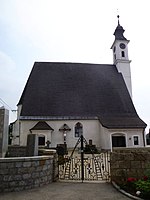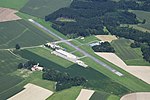The Innviertel (literally German for "Inn Quarter"; officially called the Innkreis; Bavarian: Innviadl) is a traditional Austrian region southeast of the Inn river. It forms the western part of the state of Upper Austria and borders the German state of Bavaria. The Innviertel is one of the four traditional "quarters" of Upper Austria, the others being Hausruckviertel, Mühlviertel, and Traunviertel.
The Innviertel is the northwestern quarter of Upper Austria and includes the districts Braunau am Inn, Ried im Innkreis and Schärding. Since the formation of the political districts in 1868, the quarters in Upper Austria no longer have a legal basis and are purely regional names. The older Habsburg districts (Kreise), which were still based on the old quarters, were superseded.
Unlike the rest of Upper Austria, most of the area was part of Duchy and, later, Electorate of Bavaria until the 1779 Treaty of Teschen. It is a fertile, densely populated, flat to hilly landscape that is part of the Alpine foothills and lies between the rivers Salzach, Inn, Danube and the Hausruck hills. The Innviertel covers an area of around 2250 km² and its population is just under 218,000.
The largest city in the Innviertel in terms of area and inhabitants is Braunau am Inn with 17,438 inhabitants, followed by Ried im Innkreis (12,209). The town of Schärding with 5,216 inhabitants is well-known as a tourist centre because of its baroque town centre.











